Floyd Killing ‘Moved the Needle’ on Race
Leona Allen Named Deputy Publisher in Dallas
Philly Guild Documents Racial Pay Gap
Latino Caucus at L.A. Times Issues Demands
Wall St. Journal Reporters Knock Opinion Pages
Joy Reid’s New Show Debuts With a Bang
Next Nieman Class to Begin Fellowship Online
Ebony Being Forced Into Bankruptcy
Dallas Morning News Boosts Education Coverage
Medill Plans to Help Develop Teen Journalists
J-Veteran Carlos Sanchez Stricken With COVID
Passings:
Jessie Mangaliman, Advocate for Immigrant Rights
Harlan McKosato, ‘Voice of Indian Country’
Nina Kapur of WCBS-TV, Fatality in Moped Accident
Charles Evers Was Mississippi Radio Pioneer
BET, USA Today Producing Specials on John Lewis
Journal-isms Fund Drive Continue
Short Takes
[btnsx id=”5768″]
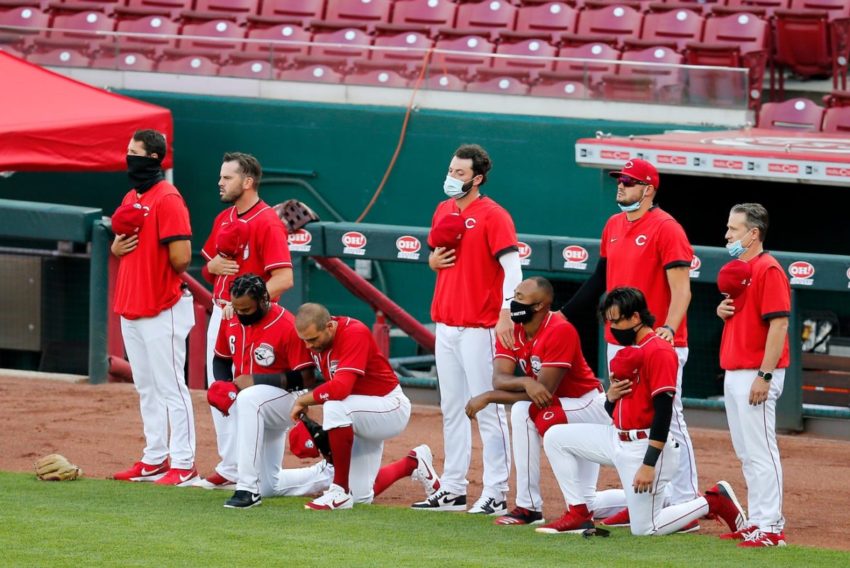
Floyd Killing ‘Moved the Needle’ on Race
“Voters in growing numbers believe that Black and Hispanic Americans are discriminated against, and a majority of 56% holds the view that American society is racist, a new Wall Street Journal/NBC News poll finds,” [paywall] Sabrina Siddiqui reported Tuesday for the Wall Street Journal, also summarized in the Daily Beast.
“The poll finds that Americans of all races and age groups share significant concerns about discrimination nearly two months after George Floyd, a Black man, was killed in police custody in Minneapolis. Nearly three-quarters of Americans, 71%, believe that race relations are either very or fairly bad, a 16-point increase since February.
“In other signs of substantial shifts in views on race, more voters see racial bias as a feature of American society and support protests aimed at addressing it [PDF]. Nearly 60% in the survey said that Black people face discrimination, and just over half said so of Hispanics, about double the shares from 2008. Support has also grown for two of the public responses to concerns about inequality: the Black Lives Matter movement and professional athletes’ practice of kneeling during the national anthem. . . .”
The Journal/NBC News poll was called “its deepest look at race in America in two decades.”
“Americans are concerned about issues of inequality, and George Floyd’s death helped contribute to that,” said Brenda Lee, a pollster who worked on the survey with Democrat Jeff Horwitt and Republican Bill McInturff. ‘We’ve moved the needle a great deal in terms of just clearly identifying that we, as Americans, have an issue with racism in this society. . . .”
In a summary prepared for the media, Horwitt wrote Thursday, “In 2020, America has real work to do in addressing issues of racial and social justice and plenty of John Lewis’ “good trouble” to get into.
“Yes, the idea that Black Lives Matter matters in a way that it did not prior to George Floyd’s death. And a majority of Americans are supportive of the protests focused on the treatment of Blacks in America.
“But, while Dr. King’s belief that the arc of the moral universe bends towards justice is true, Americans believe that at least on one fundamental measure, it hasn’t bent at all in more than 30 years. Just as was the case in 1988, a majority of Americans believe that our society is racist. And going back to 1994, evaluations of race relations in America are near an all-time low, driven by non-Black Americans. What has changed over time is awareness and an acknowledgment of discrimination in our society against people of color, but there are deep partisan divisions on this measure. . . .”
The Journal/NBC News poll surveyed 900 registered voters July 9-12. The margin of error was plus or minus 3.27 percentage points.
- Rhett Butler, Shadow League: Shaun King Came For White Jesus And Twitter Erupted (July 2)
- Russell Contreras, Associated Press: Hispanic activist wants Chicano Studies classes censored
- Getty Images: Black Lives Matter (June 15)
- Getty Images: Getty Images Announces the Recipients of its 2020 Inaugural Inclusion Scholarships (July 9)
- Shirley Ann Higuchi, Star Tribune, Minneapolis: Black Americans helped Asian Americans find their voice
- Angelique Jackson, Variety: Why Black Hollywood Wants More Representation in the Hair and Makeup Department
- Latino Decisions: Latino Families Have Personal Connections to the Pain of the Black Community Due to Similar Experiences With Police Brutality
- Pema Levy, Mother Jones: Another Monument to White Supremacy That Should Come Down? The Electoral College
- Marissa Martinez, The Objective: On diversity, college newsrooms don’t get a pass (July 3)
- Clark Merrefield, Journalist’s Resource: Race and the newsroom: 7 studies to know
- Carolina A. Miranda, Los Angeles Times: Goodbye, guy on a horse. A new wave of monument design is changing how we honor history
- Mary Emily O’Hara, Adweek: Asian American Marketing Leaders Want to Smash ‘Model Minority’ Myth
- Dion Raboui, Axios, The myth of closing the racial wealth gap through “stronger families”
- Savannah Robinson, YR: Young Black Journalists Envision a Media Revolution
- Deepa Seetharaman and Jeff Horwitz, Wall Street Journal: Facebook Creates Teams to Study Racial Bias, After Previously Limiting Such Efforts [paywall]
- Casey Wexler, Media Matters for America: Mainstream media need to stop using euphemisms to describe Trump’s racism
- Tom Withers, Associated Press: [Cleveland] Indians to meet with Native Americans on potential new name
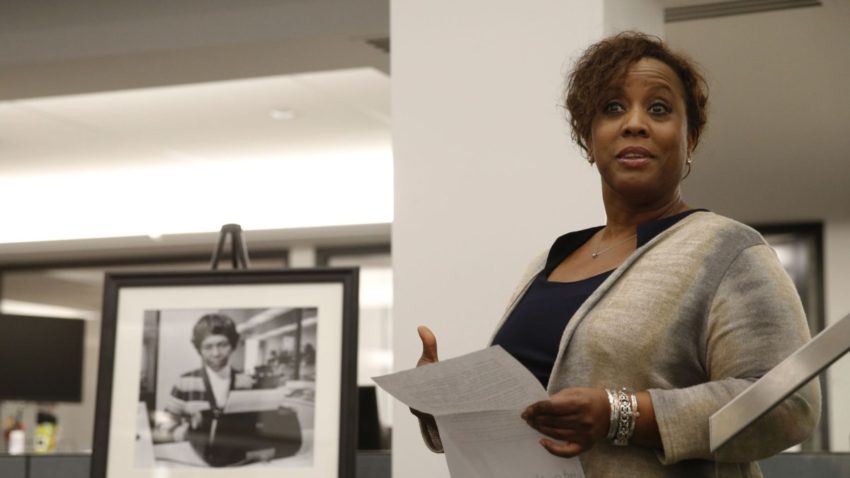
Leona Allen Named Deputy Publisher in Dallas
“Leona Allen, a Dallas native and longtime editor at The Dallas Morning News, is being elevated to a new position of deputy publisher responsible for diversity and inclusion across the company,” Maria Halkias reported Monday for the Dallas Morning News.
“Allen’s promotion makes her one of the highest-ranking Black female executives in the newspaper industry. Her role grew out of efforts that started last fall to make the company’s workforce more representative of the community it serves. . . .”
The National Association of Black Journalists counts two African American general-interest newspaper publishers, Rodney Mahone, who on June 1 was named president of the McClatchy Co.’s Georgia markets, and Alberta Saffell Bell, owner and publisher of The Gardner in Gardner Mass.
Mahone had been publisher of The Charlotte Observer and oversaw some of McClatchy’s South Carolina papers.
A spokesperson for the News Media Alliance, which represents newspaper publishers, said of the racial data, “Unfortunately, we don’t track this information.”
Allen, 56, “said the job links together her passions for journalism, Dallas and the people who work at the company,” Halkias wrote.
“ ‘We need to have some open and frank discussions,’ she said. ‘There’s a sense of urgency and there’s a reckoning. We can’t just show up when there’s a tragedy. As journalists, we have to understand all our communities.’ ”
Grant Moise, the newspaper’s publisher and president, said, “Leona is going to work with every department at the newspaper because we need a universal approach. The only way we can be excellent is to make this effort permanent. It can’t be a project or an initiative. It has to be ongoing and with accountability.”
Philly Guild Documents Racial Pay Gap
In the Philadelphia Inquirer newsroom, of “24 people who received merit raises, just 3 were people of color,” the News Guild of Greater Philadelphia reported Friday. “Of 14 new hires since March 2019, just 6 were people of color. As for salaries, at the Inquirer, the average salary of females of color [is] nearly $10,000 less than the total average of all newsroom employees. Appalling. . . .”
The Guild leaders concluded, “As the Company embarks on study groups, surveys, and Zoom meetings to reckon with its systemic racism, it needs to do nothing more than look at our pay study results and promptly make the payroll adjustments long overdue, including instituting true opportunities for raises in circulation, finance, and advertising/marketing.
“We will be sharing our study results with the publisher. She has announced the Company is embarking on its own pay study. We assert that should not delay the start of fixing the disparities our consultant has identified.”
- Charlotte Tobitt, Press Gazette (U.K.): ITN reaches ethnic minority representation target but pay equality with white staff still lacking
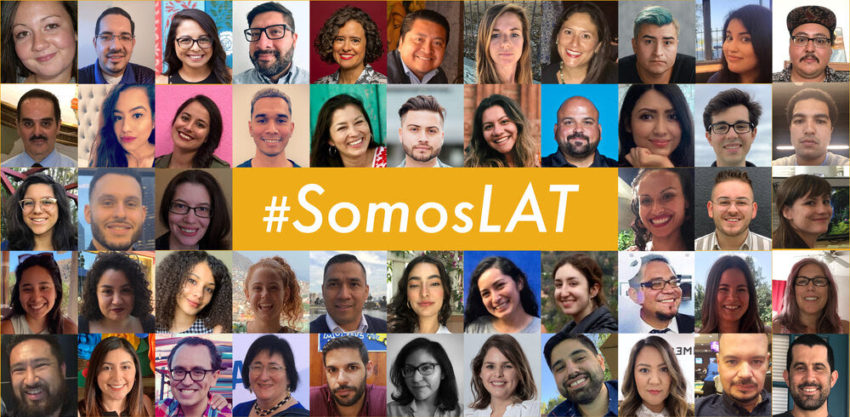
Latino Caucus at L.A. Times Issues Demands
“For much of its history, the Los Angeles Times has covered the Latino community in dehumanizing ways, painting us as criminals or victims or simply ignoring us,” Latino employees of the L.A. Times wrote Tuesday to management, attaching a list of demands.
“The Times slurred Mexicans as ‘greasers’ and ‘wetbacks’ and immigrants without legal status as ‘border jumpers’ and ‘illegal aliens.’ It advocated for the invasion of Latin American countries, and vilified Central Americans as they sought refuge in Los Angeles during the exodus of the 1980s.
“Today The Times continues to fail, in its staffing and coverage, to reflect a region where nearly one of every two residents is Latino. In doing so it has neglected to serve what should be its largest audience. . . .
“The Latino Caucus was established in July 2020 to call for change. We did so inspired by our Black colleagues, who formed the L.A. Times Guild’s first Black Caucus and pushed open the doors of what is possible. . . . “
The caucus’ 14 demands include:
“1) We stand in solidarity with the Black Caucus and want continued commitment to their demands.
“2) Stop treating Latinos as a minority group. The newspaper must center our stories — online, in images, podcasts and L.A. Times Studio projects. Latino subscribers are fundamental to our survival, and how we regard or disregard this demographic moving forward determines our journalistic relevance and market value.
“3) Build a newsroom that reflects the demographics of L.A. County, where Latinos are nearly 50% of the population. To start, we ask for a pledge that you hire enough Latino journalists to, at a minimum, meet the county’s demographics halfway within a period of five years. (This should not include interns, Metpros [originally Minority Editorial Training Program] or editorial assistants). Ensure that these hires won’t be tokenized or only expected to tell Latino stories. While we take pride in telling the stories of our community, we can report on others just like anyone else. Prioritize hiring Latinos to the following posts or departments, which currently list zero or only one permanent Latino staffer. . . .”
Hillary Manning, spokesperson for the Times, messaged Journal-isms Friday, “There has not been a formal response to the letter from the Latino Caucus. The executive leadership of the company, including the masthead editors, have responded directly to the Latino Caucus and have begun follow-up conversations.”
CCNMA: Latino Journalists of California expressed solidarity with the Latino Caucus.
Wall St. Journal Reporters Knock Opinion Pages
“Wall Street Journal reporters have long grumbled about the paper’s Opinion pages,” Joe Pompeo wrote Thursday for Vanity Fair. “It’s not necessarily about the opinions themselves — folks in the newsroom accept that they’re a mainstay in the ecosystem of conservative thought — but rather the section’s sometimes ‘casual relationship with facts,’ in the words of Bill Grueskin, a former high-ranking Journal editor, ‘which could cause problems with sources.’
“Paul Steiger, the longtime former managing editor, used to say to reporters, ‘Just tell your sources they’re getting two newspapers for the price of one.’
“For years, as Grueskin put it, ‘those grumblings were muted.’ Not anymore. On Tuesday, a letter about the Opinion section signed by more than 280 reporters, editors, and other employees was submitted to Almar Latour, a former Journal editor who is now the paper’s publisher. Even more surprising to some insiders was that the Journal, not typically known for covering its internal controversies and goings-on, wrote about the letter [paywall], which organizers had asked their colleagues not to leak. . . .”
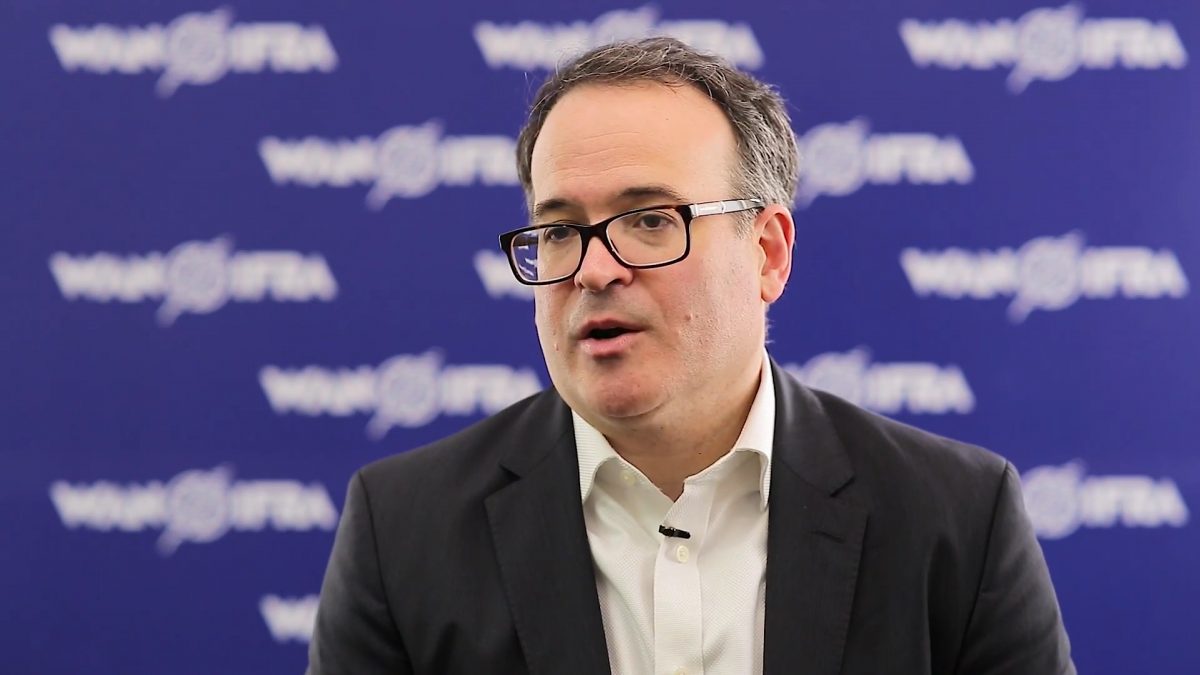 Pompeo also wrote, “The letter was the latest example in what appears to be a rising tide of newsroom activism within the Journal, which is owned by Rupert Murdoch’s News Corp. In June, a group of Journal employees sent a letter to management criticizing a May 15 column, ‘The Often Distorted Reality of Hate Crime in America,’ by their former editor in chief, Gerard Baker. . . .
Pompeo also wrote, “The letter was the latest example in what appears to be a rising tide of newsroom activism within the Journal, which is owned by Rupert Murdoch’s News Corp. In June, a group of Journal employees sent a letter to management criticizing a May 15 column, ‘The Often Distorted Reality of Hate Crime in America,’ by their former editor in chief, Gerard Baker. . . .
“Another letter in June, sent to Baker’s successor, the long-serving and highly respected Journal editor, Matt Murray (pictured), tackled newsroom diversity and coverage of race, ethnicity, and inequality. ‘In part because WSJ’s coverage has focused historically on industries and leadership ranks dominated by white men, many of our newsroom practices are inadequate for the present moment,’ said the letter, according to the Times.
“It offered a number of proposals, which Murray and the Journal have already begun making progress on, including the capitalization of ‘Black’ as an ethnic qualifier and the elevation of an African American editor to a top newsroom leadership position. . . .”
- Editorial, Wall Street Journal: A Note to Readers: These pages won’t wilt under cancel-culture pressure. [paywall]
- Sarah Ellison and Elahe Izadi, Washington Post: The Harper’s ‘Letter,’ cancel culture and the summer that drove a lot of smart people mad
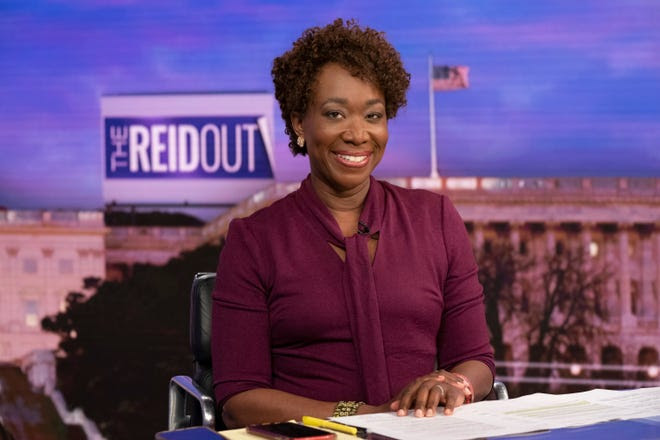
Joy Reid’s New Show Debuts With a Bang
“Joy Reid’s prime-time MSNBC show ‘The ReidOut’ debuted with a bang Monday, pulling in 2.6 million viewers as she interviewed guests such as Democratic presidential candidate Joe Biden, former Secretary of State Hillary Clinton and Mayors Lori Lightfoot (Chicago) and Keisha Lance Bottoms (Atlanta),” Erin Jensen wrote Thursday for USA Today.
It was the second-highest rating ever for any regularly scheduled 7 p.m. program on MSNBC, an MSNBC spokesperson confirmed. Only a “Hardball with Chris Matthews” show in September 2018 rated higher.
Jensen continued, ” ‘We made big asks,’ says Reid, who took over MSNBC’s 7 p.m. slot formerly occupied by ‘Hardball With Chris Matthews’ until he resigned in March, after accusations he made inappropriate comments about women. ‘We were like, “Who can we get? Let’s ask for Oprah, Barack Obama, Michelle Obama, Biden and Hillary!” So, we threw out a pretty wide net – LeBron (James). We really just threw out a wish list and a lot of those guests said yes.’ . . .”
Jensen also wrote, “Reid understands that young Black girls will be tuning in to watch her behind the desk, as one of just a handful of Black women to anchor evening news shows, with the same admiration she felt for Gwen Ifill and Carole Simpson.
“On Monday, CNN legal analyst Elliot Williams tweeted his 3-year-old daughter’s immediate response to Reid on-screen. She shouted, ‘SHE HAS CURLY HAIR JUST LIKE ME!’ Williams posted. ‘Representation is no joke, people.’
” ‘I’m saving that in my phone because that’s one of those moments where really you do take stock in how important it is to have this kind of representation,’ Reid says. ‘It’s the same way that we all felt when, for the first time, the president and the first family looked like our families. … You really do understand that it isn’t just a visual treat to have that kind of diversity, that it actually does matter.’ . . .”
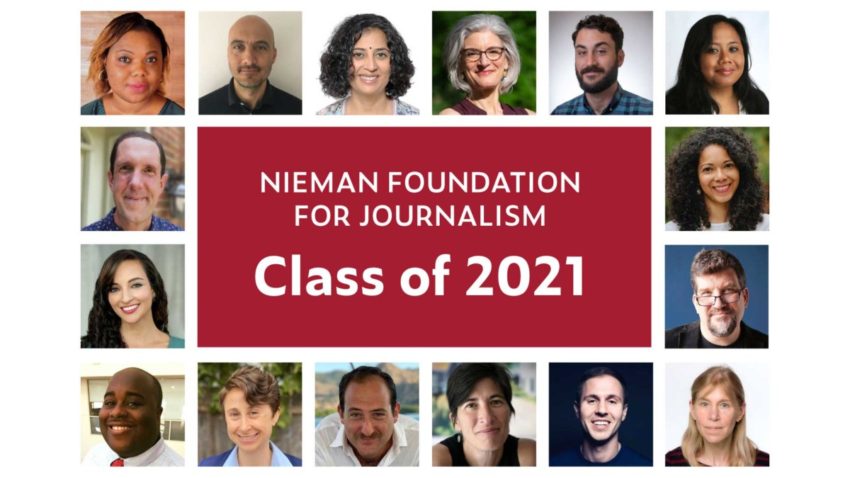
Next Nieman Class to Begin Fellowship Online
Bukola Adebayo, Yasmin Amer, Austin Bogues, Vidya Krishnan and Amber Payne are among 16 journalists chosen Nieman Fellows for the fellowship program’s 83rd class, the Nieman Foundation for Journalism has announced.
Adebayo is a senior producer for CNN Digital in Lagos, Nigeria; Amer is most recently a senior podcast reporter and producer for WBUR’s iLab in Boston; Krishnan is an investigative reporter based in India; Bogues is a reporter for the Asbury Park Press in New Jersey; and Payne is executive producer at BET Digital in New York.
“Due to Harvard campus restrictions related to the COVID-19 pandemic, the academic-year fellows will begin their fall studies online . . .,” the program said Wednesday.
“In addition, Nieman will offer remote visiting fellowships this coming year in support of projects that address racial justice and public health in the U.S., dual challenges underscored by the growing anti-racism movement and the global coronavirus pandemic.”
The John S. Knight fellowship program at Stanford University announced this month, “We are creating a remote fellowship model specific for the upcoming 2020-2021 cycle to address the urgent needs of our times. Fellows will craft and develop practical solutions that address the flaws in how our industry serves communities of color in the United States.
“The John S. Knight Community Impact Fellows will do this by working remotely on projects to address information gaps in those communities. . . .”
At the University of Michigan, “For the coming academic year, we are turning our Knight-Wallace Fellowship model outward, to fund long-term reporting projects examining momentous challenges and responses in this year of converging crises,” that program announced in June.
“We’ll select a cohort of ten accomplished journalists with different backgrounds and experience for a working fellowship to report on our most pressing issues, from social shifts precipitated by the pandemic to persistent social justice issues surrounding race, ethnicity and inequality. . . .”
- Laura Hazard Owen, Nieman Lab: Apply now for the Nieman Foundation’s new visiting fellowships on racial justice and public health in the U.S.
Ebony Being Forced Into Bankruptcy
“The owner of Ebony magazine is being forced into bankruptcy by creditors who say they want to take over the storied publication, which has chronicled Black culture for 75 years but has declined rapidly since being sold by its founding publisher, Johnson Publishing Co.,” Jonathan Randles and Lukas I. Alpert reported Thursday for the Wall Street Journal. [paywall]
“The involuntary bankruptcy filing Thursday comes less than a month after Ebony Media Holdings LLC’s primary shareholder, Willard Jackson, was fired as chief executive and removed from the board. The company said it was launching an investigation into financial transactions he had made without board or lender approval.
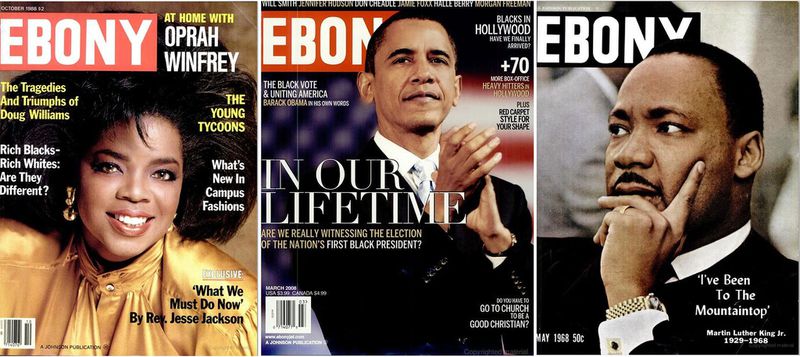 “An Ebony Media spokeswoman said the publisher had no immediate comment.
“An Ebony Media spokeswoman said the publisher had no immediate comment.
“Once one of the most widely distributed and influential voices for Black America, Ebony magazine has been in a state of accelerating decline for years. It stopped publishing in print in 2019.
“Jacob Walthour, Ebony Media’s recently appointed chairman, said the intention wasn’t to liquidate the business.
“ ‘The goal is to get control of the company, not to break it up and sell it off in pieces,’ he said. ‘We are petitioning to have the digital operation continue while we clean up the balance sheet.’
“By forcing the company into bankruptcy, creditors can help install an independent trustee to scrutinize the publisher’s finances and create a court-supervised process to repay debt. . . .”
- Lukas I. Alpert and Lee Hawkins, Wall Street Journal: Behind the Fall of Ebony: Accusations of Fraud and a Fight Over Control of a Black Media Dynasty [paywall]
- Hanaa’ Tameez, Nieman Lab: Here’s how CUNY’s new Black Media Initiative aims to elevate and serve Black publications

Dallas Morning News Boosts Education Coverage
“The Dallas Morning News will launch a new initiative this fall expanding its education coverage, adding two staff members and a fellow solely focused on the topic, and doubling its production of in-depth coverage of education issues in North Texas and the rest of the state, Corbett Smith reported for the newspaper.
“The effort, called the Education Lab, will be the newspaper’s largest foray into community-funded journalism, where reporting is supported by direct, outside philanthropic funding.
“Seven Dallas-area foundations, families and institutions have pledged $210,000 annually for two years to help launch the Education Lab: Communities Foundation of Texas, The Meadows Foundation, The Dallas Foundation, Southern Methodist University, Todd A. Williams Family Foundation, The Beck Group, and Bobby and Lottye Lyle. . . .”
Writing June 19, Smith added, “Over the next three months, The News will hire an editor to shepherd the project, one full-time education writer, an education fellow and an audience engagement editor tasked with building a digital audience and organizing quarterly community events. Those hires will join two education reporters already in the newsroom. . . . .
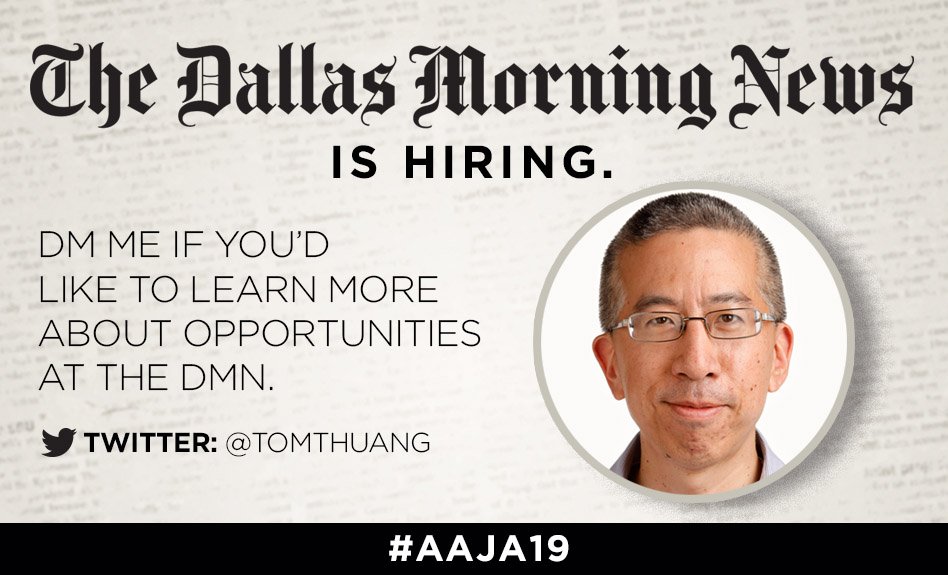 “The Seattle Times’ own Education Lab was one of the models for the new effort, said Tom Huang (pictured), The News’ assistant managing editor for journalism initiatives.
“The Seattle Times’ own Education Lab was one of the models for the new effort, said Tom Huang (pictured), The News’ assistant managing editor for journalism initiatives.
“The Seattle newspaper has launched three community-funded journalism hubs over the past six years, focusing on education, homelessness and transportation. Its Education Lab, which started in 2013, is funded through a partnership among the Bill and Melinda Gates Foundation, Amazon, the City University of Seattle and the New York-based nonprofit Solutions Journalism Network.
“Huang, who spearheaded The News’ efforts, said he hopes the lab in Dallas will be an incubator for new and creative ideas, including solutions-based journalism, more data journalism and visualization, and a continued focus on diversity and inclusion that will connect to Dallas’ diverse communities. . . .”
- Anita Varma, Medium.com: Beyond the statement: How journalism funders can act in solidarity with marginalized communities
Medill Plans to Help Develop Teen Journalists
Northwestern University’s Medill School of Journalism, Media, Integrated Marketing Communications received a $1 million grant from the Robert R. McCormick Foundation to support local news and to encourage students in Chicago Public Schools to become journalists, Mariam Ahmed reported Thursday for Talking Biz News.
The money is also to be used to launch “the Metro Media Lab, a student-run organization that will examine how to better create and deliver local news. The lab will also train local journalists starting new media outlets,” Ahmed wrote.
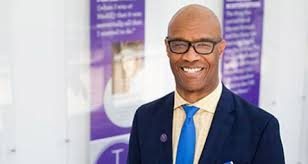 Medill Dean Charles Whitaker (pictured) messaged Journal-isms, “We’re still working on our CPS plan. A few of the ideas include a program to teach teachers how to start and maintain journalism programs, and hosting workshops at schools around the city (whenever we’re able to meet in person again). We also want to expand a program called ‘Medill Media Teens,’ which has Medill students working with teens in our downtown Chicago newsroom once a week to develop multimedia skills.’
Medill Dean Charles Whitaker (pictured) messaged Journal-isms, “We’re still working on our CPS plan. A few of the ideas include a program to teach teachers how to start and maintain journalism programs, and hosting workshops at schools around the city (whenever we’re able to meet in person again). We also want to expand a program called ‘Medill Media Teens,’ which has Medill students working with teens in our downtown Chicago newsroom once a week to develop multimedia skills.’
“Most of these plans are still being honed. A faculty committee is charged with fleshing out the details by the start of the term in September.”
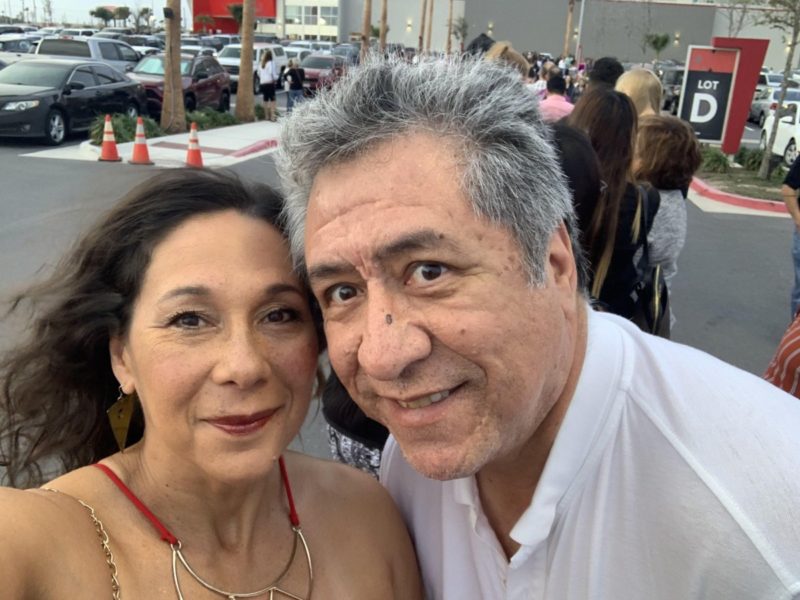
J-Veteran Carlos Sanchez Stricken With COVID
“I’ve sat near a lot of newspaper folks during my many years of newspapering, none more entertaining than my longtime friend Carlos Sanchez,” Ken Herman reported Thursday for the Austin American-Statesman.
“You never knew what would come out of his mouth. This was a favorite, oft overheard as he semi-diplomatically tried to get rid of pesky callers who overstayed their welcome:
“ ‘I’d love to keep talking with you, but I have a lot of typing to do.’
“So imagine my consternation when I recently called Carlos and he reported this news:
“ ‘I’m dying,’ he said in a feeble and convincing voice.
“He was in an Edinburg hospital, along with so many others, battling COVID-19.
“Carlos is a proud native of El Paso whose distinguished career in journalism has taken him many places. When he worked for The Washington Post, he covered the Bobbitt family dispute. If you don’t remember that, look it up. It was about a separation that happened prior to a couple’s separation.
“In addition to serving as state editor at the American-Statesman, Carlos was top editor at a couple of Texas papers. He was an editor who cared deeply about the communities his newspapers served. When he was editor of The Monitor in McAllen, he cared deeply about that community.
“And when he was editor of the Waco Tribune-Herald, he cared deeply about Waco. Let me repeat that: He cared deeply about Waco.
“Most recently, he did political editing and writing for Texas Monthly, which included moving from Austin back to the Rio Grande Valley to cover that territory for the magazine.
“In February, Carlos, as they say, went in another direction. Like many in our struggling business, he’d been whipsawed by an industry that he loved but didn’t always love him back. So he found another perch in which he figured he could make a difference to his community. He became head of the public affairs division for Hidalgo County Judge Richard Cortez.
“And that put Carlos on a collision course with COVID-19 that began with a March 21 news advisory headlined ‘First Case of COVID-19 in Hidalgo County is Confirmed.’ . . .”
- Evelyn Mateos, Editor & Publisher: USA Today Network Launches Series That Highlights Essential Food Workers
Passings
Jessie Mangaliman, Advocate for Immigrant Rights
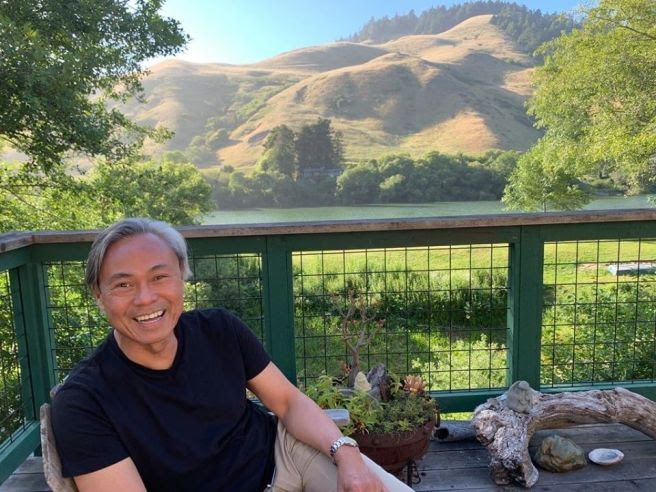 “Jessie Riogelon Mangaliman (pictured, courtesy John Meier), an undocumented Filipino immigrant who left behind a leaky house in Manila for a high school exchange program in Oklahoma and went on to win a Pulitzer prize, died of an apparent heart attack Monday July 20, 2020 at his home in Oakland, CA,” Donna Kato and Maureen Fan wrote Friday. “He was 63.
“Jessie Riogelon Mangaliman (pictured, courtesy John Meier), an undocumented Filipino immigrant who left behind a leaky house in Manila for a high school exchange program in Oklahoma and went on to win a Pulitzer prize, died of an apparent heart attack Monday July 20, 2020 at his home in Oakland, CA,” Donna Kato and Maureen Fan wrote Friday. “He was 63.
“Mangaliman, a role model for legions of journalists, particularly Asian-Americans and other people of color, was a crisis manager, gourmet cook and lifelong advocate for immigrant rights. When he became a US citizen in the 1990s, he was invited to a ceremony for 300 new Americans on Ellis Island and was one of five singled out for a special presentation as exemplary citizens.
“After beginning his journalism career in Oklahoma, Mangaliman went on to high-profile assignments for USA Today, New York Newsday, The Washington Post, and the San Jose Mercury News. But his work also took him from a summer gutting salmon on a fishing boat in Alaska to the Federal Reserve Bank of San Francisco.
“And yet the experience of living undocumented for years pervaded his world-view. In 1988, he wrote about covering a press conference at the Immigration and Naturalization Service: ‘To be in an INS office again … was to know mortification. In my nightmare, I was hauled away, deported. But my pen and notebook provided a shield to hide my terror and my secret. I filed my story that afternoon. I went home exhausted, desperate.’
“By September that year, with help from a New York Newsday lawyer, Mangaliman obtained a green card, assisted by columnist Sydney Schanberg and photographer Dith Pran of ‘The Killing Fields’ fame. But he never forgot the fear. . . .”
- Asian American Journalists Association: AAJA mourns loss of longtime member Jessie Mangaliman
Harlan McKosato, ‘Voice of Indian Country’
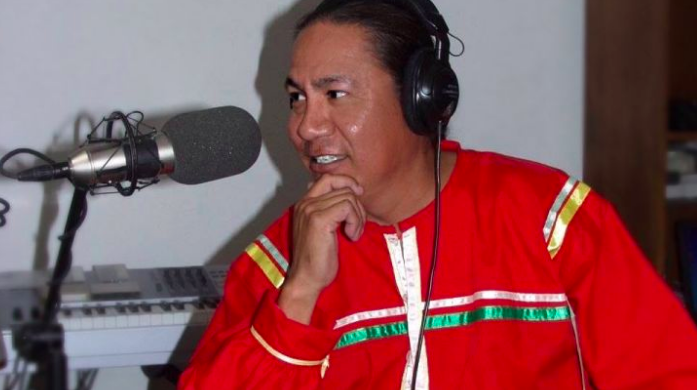 “A man who spent 12 years as the host and producer of the nationally broadcast radio show Native America Calling and was once considered the ‘voice of Indian Country’ died Tuesday, surrounded by friends and family,” Kevin Abourezk wrote Wednesday for indianz.com.
“A man who spent 12 years as the host and producer of the nationally broadcast radio show Native America Calling and was once considered the ‘voice of Indian Country’ died Tuesday, surrounded by friends and family,” Kevin Abourezk wrote Wednesday for indianz.com.
“Harlan McKosato (pictured), 54, was a citizen of the Sac and Fox Nation of Oklahoma. He grew up on the Iowa Reservation in the north-central part of the state.
“ ‘Harlan was an icon in Indian Country for his award-winning contributions to world news outlets,’ his family said in a statement following his passing in Albuquerque, New Mexico, on Tuesday. ‘He possessed a unique storytelling ability that enabled him to report on any subject in profound ways.’ “”
Jenni Monet added Friday for her “Indigenously” newsletter, “Harlan’s life and death is both a story of humor and tragedy. He was downright goofy, at times, going on shows like the Family Feud. He had a gift for making hard conversations less so. But he also battled addiction from what else but living while being Native. It’s hard and even for someone like Harlan who [shone]. He wasn’t immune to the Indigenous struggle. As I write in my latest column for Indigenously, in many ways, he’s emblematic of it.
“Harlan’s sister described him as a ‘hayseed” a word I hadn’t heard before until this week. In the most literal sense, it means a seed obtained from hay. More figuratively, for someone exactly like Harlan, it defines a simple person from the bottom-up. In this sense, Harlan was Indian Country’s everyman.
“The timing of his passing, for me, is poignant as my industry reckons with its own institutional racism. They are realities that Harlan wasn’t immune to, all those years he worked in public broadcasting, perhaps the whitest workplace in America. In this regard, there is much to reflect on Harlan the Hayseed in this moment. . . .”
Nina Kapur of WCBS-TV, Fatality in Moped Accident
 “A 26-year-old CBS New York reporter died after a moped accident Saturday, the station announced in a video tribute,” Elisha Fieldstadt reported Monday for NBC News.
“A 26-year-old CBS New York reporter died after a moped accident Saturday, the station announced in a video tribute,” Elisha Fieldstadt reported Monday for NBC News.
“Reporter Nina Kapur (pictured) joined the team in June 2019 and was known for her contagious smile and love for storytelling,” the station shared. She died at Bellevue Hospital in Manhattan after the accident, the station reported, adding, ‘Our thoughts and prayers are with Nina’s family. She will be missed.’
“Before joining CBS New York as an on air reporter, Kapur had worked at News 12 Connecticut since 2017. ‘News 12 staff members are remembering Kapur for her incredible work ethic, as well as her sense of humor and smile,’ a statement from the station said. . . .”
IANS, India’s largest independent news agency, described Kapur as Indian-American.
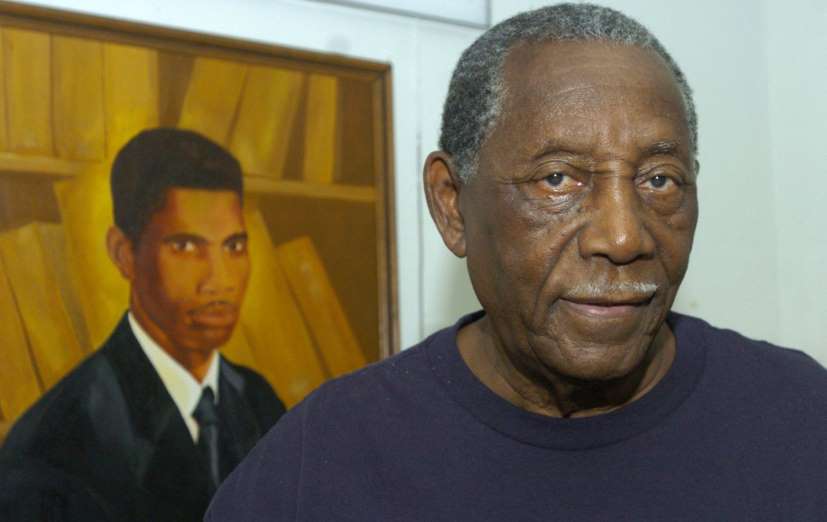
Charles Evers Was Mississippi Radio Pioneer
When civil rights icon Charles Evers (pictured), brother of Medgar Evers, died Wednesday at 97, most news stories mentioned that he was the first Black elected mayor of a Mississippi city, Fayette, had taken up his brother’s mantle after Medgar’s assassination in 1963, and became active in politics.
Less known is that he was owner and general manager of a radio station, WMPR-FM in Jackson.
“He had given people a voice, a chance to express themselves and to have great radio,” his daughter, Wanda Evers, the current general manager, told Journal-isms by telephone.
Evers bought the station in 1975, making it the first Black-owned 100,000-watt radio station in the state, she said. “We just added a little jazz and a little reggae” to its gospel-and-blues format. Evers conducted a “Let’s Talk” program on WMPR after his mayoral term. He turned the station over to his daughter in 2017.
The station calls itself “The voice of the community.” It plans to carry a memorial service for Evers on Aug. 7, time to be determined, his daughter said.
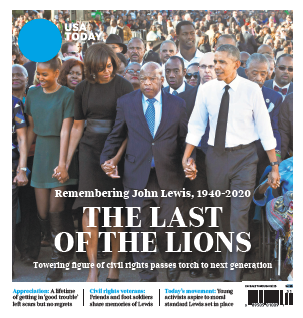
BET, USA Today Producing Specials on John Lewis
BET is airing a special on the late John Lewis Sunday, and USA Today has put together a special edition on the Georgia congressman and civil rights hero that goes on sale Monday.
“BET will honor the legacy of former U.S. Representative John Lewis with an exclusive news special called ‘JOHN LEWIS: IN HIS OWN WORDS,’ airing Sunday, July 26 at 7:30 PM ET/PT on BET and BET HER,” the network announced.
“Hosted by CBS News correspondent Jericka Duncan, this BET and CBS NEWS production . . . will trace his momentous journey on the frontlines of history, from the freedom rides to the Black Lives Matter Movement, and one of the last interviews he conducted before his death. . . .”
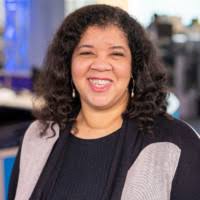 USA Today’s 40-page special section, which sells for $4.95, was edited by Nichelle Smith (pictured), coordinating editor of the USA Today investigations/enterprise team. She has edited the publication’s Black History Month editions.
USA Today’s 40-page special section, which sells for $4.95, was edited by Nichelle Smith (pictured), coordinating editor of the USA Today investigations/enterprise team. She has edited the publication’s Black History Month editions.
“I initiated the meeting about our John Lewis coverage just before he died,” Smith messaged Journal-isms on Saturday.
“I had told our editors for months that his passing would signal the end of the civil rights movement as we know it and would be a historical moment that would resonate with the entire country. Then, no one could have guessed that he would pass on during such an extreme time of civil unrest. I said he was so beloved and important to the nation if not the world that he deserved a commemorative edition. I was scheduled to be on furlough last week, but I was pulled off and asked to put the section together in 4 days.”
Smith added, “The issue contains the obit, appreciation, reflections from civil rights veterans and younger activists. We quote Courtland Cox and Judy Richardson,” like Lewis veterans of the Student Nonviolent Coordinating Committee (SNCC), along with Rashad Robinson, president of Color of Change, and local Black Lives Matter activists.
Participating journalists included Dwight Lewis, retired columnist for the Tennessean in Nashville; Melissa Brown of the Montgomery (Ala.) Advertiser, who interviewed Bernard Lafayette, Lewis’ college roommate; and Tonyaa Weathersbee of the Memphis Commercial Appeal. Deborah Barfield Berry and Nicquel Terry Ellis of USA Today did the bulk of the writing.
Smith continued, “We have essays and memories” from Jesse Jackson, Rep. Jim Clyburn, D-S.C.; Rep. Terri Sewell, D-Ala.; Democratic Party stalwart Donna Brazile and Kristen Clarke, president of the Lawyers’ Committee for Civil Rights Under Law; “as well as a beautiful photo essay and his most famous quotes. . . . “
Among other rebroadcasts of interviews of Lewis, C-SPAN has a “Q&A” Sunday at 8 p.m. and 11 p.m. ET; repeated Monday at 6 a.m. ET.
“In this program, the late John Lewis talked about his early involvement in the non-violent protests of the civil rights movement,” C-SPAN said. “He recounted his experience leading a group of students across the Edmund Pettus Bridge when he was 25-years-old, and commented on Martin Luther King, Jr., Stokely Carmichael, and other participants in the movement.”
- A. Peter Bailey, Washington Informer: When John Lewis Met Brother Malcolm X in Kenya
- Lauren Victoria Burke, National Newspaper Publishers Association: IN MEMORIAM: John Lewis, an American Hero and Moral Leader Alongside Martin Luther King, Jr., Dies at 80
- Nicole Carroll, USA Today: The Backstory: John Lewis urged journalists, ‘be a headlight, not a taillight’
- Mary C. Curtis, Roll Call: To remember John Lewis, remember the real John Lewis — and his righteous fight
- Joe Davidson, Washington Post: I interviewed John Lewis 45 years ago. His commitment to voting rights never wavered. (July 27)
- Emil Guillermo, Asian American Legal Defense and Education Fund: John Lewis knew we were all in the same boat
- Bernard Lafayette Jr., New York Times: The First Time John Lewis and I Integrated the Buses (July 18)
- John Lewis Legacy: Celebration of Life Ceremony (schedule for six days)
- John Mason, Arab America: Representative John Lewis, Civil Rights Giant, and Issues of Palestinian Human Rights and Self-Determination
- Kevin Merida, The Undefeated: John Lewis lived a life of grace and humility
- Connor Sheets, al.com: John Lewis takes final ride over Selma bridge
- Reginald Stuart, Washington Post: When I was 12, John Lewis talked my mom into letting me march with him
Short Takes
- In Oregon, a “US District Court judge ordered federal agents on Thursday not to target journalists and legal observers of nightly protests in downtown Portland . . .,” Jacob Fischler reported Friday for Business Insider. . . “Testimony from several journalists covering the protests in Portland raised ”serious questions’ about US Department of Homeland Security and US Marshal Service agents possibly targeting journalists. . . .”
- Spectacle “is now the best way to describe Portland’s protests,” E.D. Mondainé, president of the Portland, Ore., branch of the NAACP,” wrote Thursday in a Washington Post op-ed. “Vandalizing government buildings and hurling projectiles at law enforcement draw attention — but how do these actions stop police from killing black people? What are antifa and other leftist agitators achieving for the cause of black equality? . . . Are they really furthering the cause of justice, or is this another example of white co-optation? . . .”
- In Iowa, a “judge has ruled that prosecutors must turn over body-camera footage and other material to a Des Moines Register reporter who was arrested while covering a protest in May,” the Associated Press reported Tuesday. “Judge Christopher Kemp on Monday ordered the Polk County Attorney’s Office to give body-cam footage and reports to reporter Andrea Sahouri by the next court date,” according to the Register.
- “”Felony charges have been issued against a Detroit Police Department officer accused of shooting non-lethal ammunition at and injuring an MLive photographer and two other photojournalists covering police brutality protests in downtown Detroit,” Nathan Clark reported Monday, updated Tuesday, for MLive.
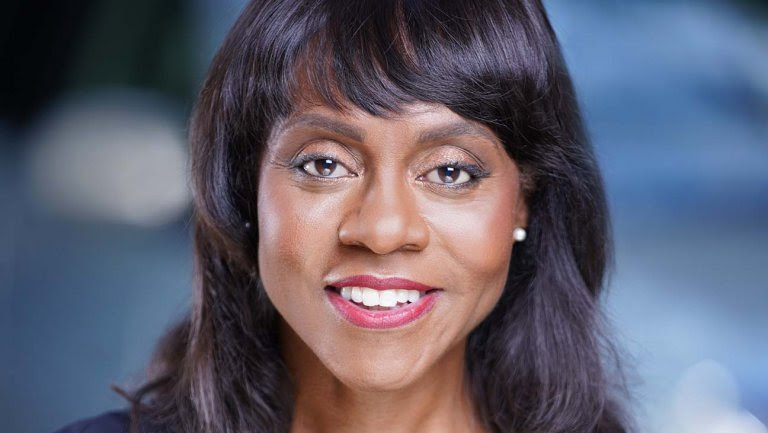 “Former TV One chief Wonya Lucas (pictured) has been tapped to serve as president and CEO of Crown Media Family Networks, a subsidiary of Hallmark Cards Inc.,” Lesley Goldberg reported Thursday for the Hollywood Reporter. “Lucas, who will begin her new post Aug. 10, will report to Hallmark Cards CEO Mike Perry. . . .”
“Former TV One chief Wonya Lucas (pictured) has been tapped to serve as president and CEO of Crown Media Family Networks, a subsidiary of Hallmark Cards Inc.,” Lesley Goldberg reported Thursday for the Hollywood Reporter. “Lucas, who will begin her new post Aug. 10, will report to Hallmark Cards CEO Mike Perry. . . .”
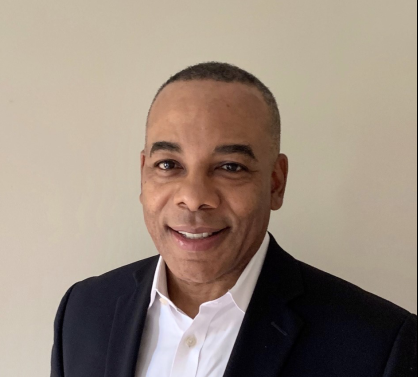 “CBS News is launching a Race and Culture Unit, and CBS News’ Alvin Patrick (pictured) will lead it,” A.J. Katz reported Thursday for Adweek. “Patrick, a senior producer at the network who has been working exclusively with CBS News special correspondent (and The NFL on CBS studio host) James Brown, will report to CBS News evp of news Kimberly Godwin, effective immediately. . . . The CBS News Race and Culture Unit will be multifaceted and help shape the coverage for the entire news division. . . .”
“CBS News is launching a Race and Culture Unit, and CBS News’ Alvin Patrick (pictured) will lead it,” A.J. Katz reported Thursday for Adweek. “Patrick, a senior producer at the network who has been working exclusively with CBS News special correspondent (and The NFL on CBS studio host) James Brown, will report to CBS News evp of news Kimberly Godwin, effective immediately. . . . The CBS News Race and Culture Unit will be multifaceted and help shape the coverage for the entire news division. . . .”
- “A stage production of Ta-Nehisi Coates’ ‘Between the World and Me,’ his prize winning book about racism and police violence, is being adapted by HBO for a special this fall,” the Associated Press reported Thursday. “HBO announced Thursday that the program will feature readings from ‘Between the World and Me’ and will be directed by Apollo Theater Executive Producer Kamilah Forbes, who handled the stage show in 2018 at the celebrated performance center in Harlem. . . .”
- The Sacramento Bee announced Wednesday “it will limit the publication of police booking photos, surveillance photos and videos of alleged crimes, and composite sketches of suspects provided by law enforcement agencies,” Ryan Lillis reported July 9 for the Bee. “Publishing these photographs and videos disproportionately harms people of color and those with mental illness, while also perpetuating stereotypes about who commits crime in our community. . . .” Similarly, MLive announced Thursday, “As a direct outgrowth of listening to our communities and to our own employees, we have one immediate response: We are discontinuing the routine use of mugshots to accompany stories about crimes. . . .”
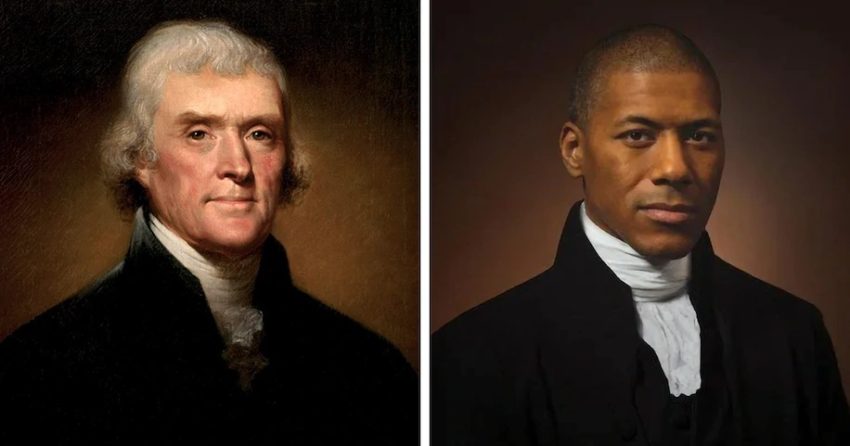
https://www.latinousa.org/2020/06/30/latinousaprx/Houston television station KIAH and a ninth-generation direct descendant of Thomas Jefferson and one of his enslaved chambermaids, Sally Hemings. British photographer Drew Gardner included LaNier in his “Descendants” series featured in the July issue of Smithsonian Magazine, along with Frederick Douglass and early suffragist Elizabeth Cady Stanton, shown side-by-side with their modern-day descendants, Cathy Free reported Thursday for the Washington Post.
- The Virginia public radio show “With Good Reason” featured the Monacan Indians’ fight for respect of their burial lands, on which Thomas Jefferson built Monticello and the University of Virginia. “We’re talking about Jefferson’s dig in 1784, and his dig actually seems to have prompted a lot of what we could call amateur archaeologists, or looters in the worst case, prompted a lot of illicit, disrespectful digging of sacred cemeteries, Jeffery L. Hantman author of “Monacan Millennium: A Collaborative Archaeology and History of a Virginia Indian People,” said on the Tuesday program. “No one would have done that to the European and Anglo cemeteries. They did their excavations well into the 20th century. . . .”
- Starting Oct. 1, “PRX will distribute Latino USA to more than 220 public radio stations across the United States,” the company announced June 30. “The Latino USA podcast will also join PRX’s portfolio of acclaimed on-demand audio. Anchored by pioneering journalist and Futuro Media Group founder Maria Hinojosa, Latino USA, offers insight into the lived experiences of Latino communities, as well as a window into the cultural, political, and social ideas shaping the nation today. National distribution has been managed by NPR since 1994. . . .”
 Eshe Nelson (pictured) is joining the Business staff of The New York Times to report from London, the Times reported Monday. “Eshe comes to us most recently from the Knight-Bagehot fellowship program at Columbia University, where she studied topics like corporate finance, economic models and narrative writing. Before Columbia, she spent three years as an economics and markets reporter for Quartz in London, writing about European fiscal policy, sustainable finance, racial economic inequality and a bit about Brexit. . . .”
Eshe Nelson (pictured) is joining the Business staff of The New York Times to report from London, the Times reported Monday. “Eshe comes to us most recently from the Knight-Bagehot fellowship program at Columbia University, where she studied topics like corporate finance, economic models and narrative writing. Before Columbia, she spent three years as an economics and markets reporter for Quartz in London, writing about European fiscal policy, sustainable finance, racial economic inequality and a bit about Brexit. . . .”
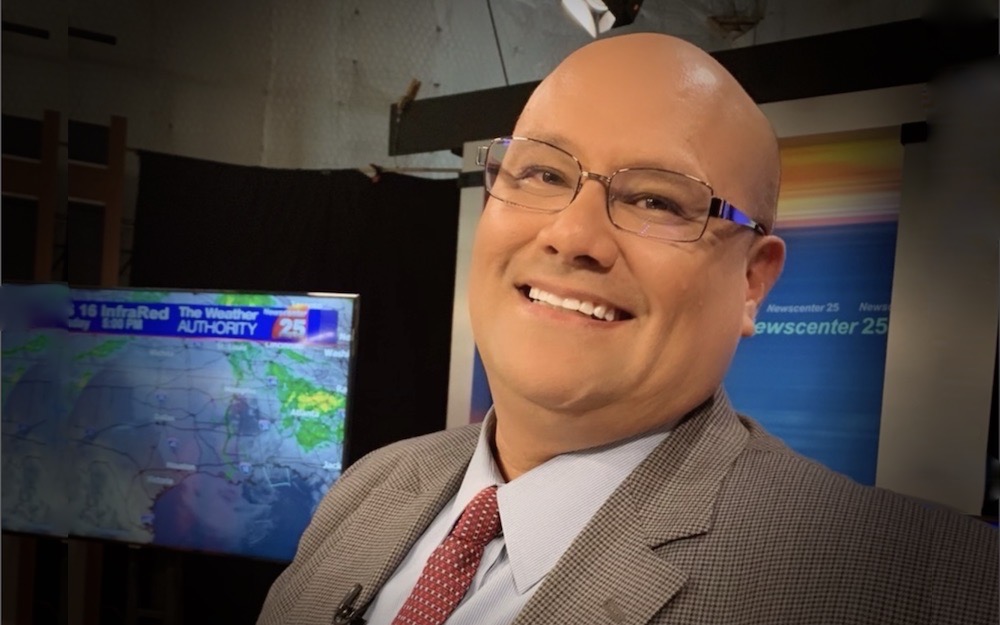 James Muñoz (pictured) is now officially news director at KAVU,” an ABC television affiliate in Victoria, Texas, Veronica Villafañe reported Tuesday for her Media Moves column. “He had been serving as interim ND since February, in addition to anchoring. . . .”
James Muñoz (pictured) is now officially news director at KAVU,” an ABC television affiliate in Victoria, Texas, Veronica Villafañe reported Tuesday for her Media Moves column. “He had been serving as interim ND since February, in addition to anchoring. . . .”
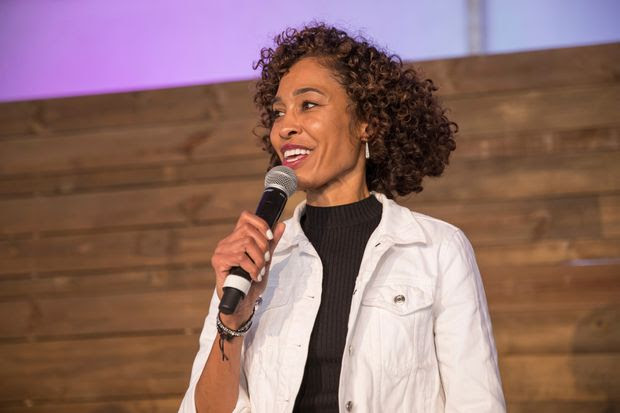 “ESPN anchor Sage Steele (pictured) has told management she believes she was excluded from a special the network aired on race last month because she wasn’t considered by certain Black colleagues to be an authentic voice for the Black community (paywall), a person familiar with the matter said,” Joe Flint reported Tuesday for the Wall Street Journal. Jason Whitlock wrote for Outkick on Wednesday, updated Saturday, that Steele’s “crime against blackness is her practice of Christianity.” Carron Phillips wrote Wednesday for Deadspin, speaking of Whitlock, “You know you’ve messed up when that man and that site are the only ones stepping up to bat for you. . . .”
“ESPN anchor Sage Steele (pictured) has told management she believes she was excluded from a special the network aired on race last month because she wasn’t considered by certain Black colleagues to be an authentic voice for the Black community (paywall), a person familiar with the matter said,” Joe Flint reported Tuesday for the Wall Street Journal. Jason Whitlock wrote for Outkick on Wednesday, updated Saturday, that Steele’s “crime against blackness is her practice of Christianity.” Carron Phillips wrote Wednesday for Deadspin, speaking of Whitlock, “You know you’ve messed up when that man and that site are the only ones stepping up to bat for you. . . .”
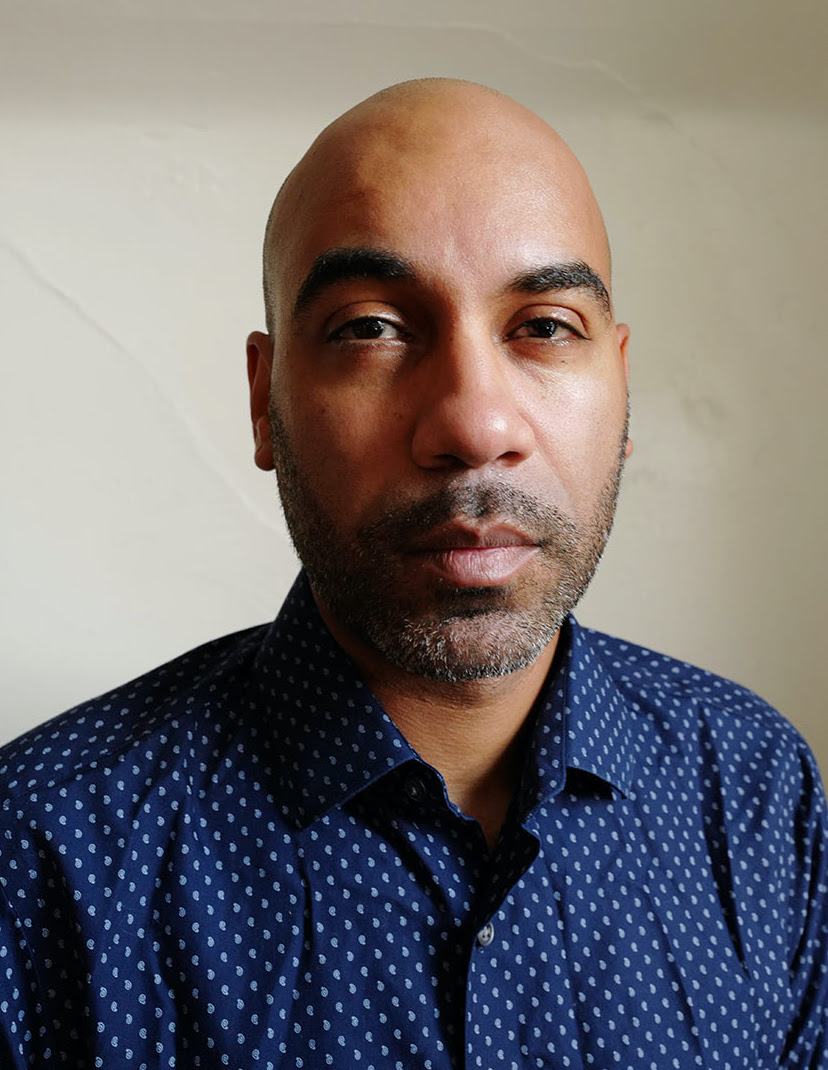 Michael M. Santiago (pictured), who left the Pittsburgh Post-Gazette last month saying his bosses had unfairly kept himself and another Black journalist from covering protests against racism and police violence, has joined Getty Images as a staff news photographer. He is conducting an “online artist talk” for the Center for Photographic Art on Thursday.
Michael M. Santiago (pictured), who left the Pittsburgh Post-Gazette last month saying his bosses had unfairly kept himself and another Black journalist from covering protests against racism and police violence, has joined Getty Images as a staff news photographer. He is conducting an “online artist talk” for the Center for Photographic Art on Thursday.
- Nick Sandmann, the high school student at the center of a video at the Lincoln Memorial that went viral last year, said he has settled a defamation lawsuit against the Washington Post over its coverage . . .,” Ted Johnson reported Friday for Deadline. “In a video that went viral on Twitter last year, Sandmann and other Covington High School students, who were in D.C. for the March for Life, appeared to be surrounding a Native American activist, Nathan Phillips, who was at the Lincoln Memorial for the Indigenous People’s March. But a longer version of the video contradicted the notion that the Covington students instigated the incident or even that they were taunting Phillips. Instead, it showed another group known as the Hebrew Israelites using vulgar language against the high school students. . . .”
- “Republican Sen. Tom Cotton introduced a piece of legislation on Thursday that will prohibit the use of federal funds to teach the award-winning New York Times piece The 1619 Project in K-12 schools,” Mariel Turner reported for The Grio. “Under the proposed Saving American History Act of 2020, schools that teach the curriculum, which covers the early history of slavery in America, would be ineligible for federal professional development grants. . . .”
- “Univision won the Wednesday ratings race among broadcasters, Te Doy La Vida pacing the network to a 0.5 in viewers 18-49, per the Nielsen overnights, and a 3 share,” Michael Malone reported Thursday for Broadcasting & Cable. “That topped NBC’s 0.4/3 . . . .”
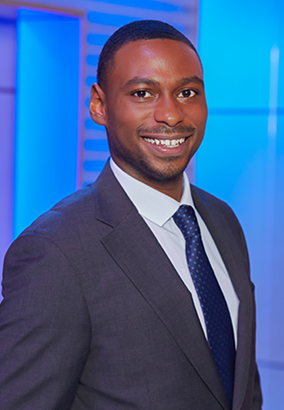 Fox News Channel has signed Charles Watson (pictured), a multimedia reporter for the network based in Jackson, Miss., since December 2018, as an Atlanta-based correspondent. Suzanne Scott, CEO of FOX News Media, said Wednesday, “We have watched Charles grow and excel in high-pressure situations guiding viewers with a calm demeanor and sharp focus during coverage ranging from tornado destruction to major flooding in the Midwest. His storytelling has impressed us from the start and we are excited to have him join our exceptional reporting team in Atlanta.”
Fox News Channel has signed Charles Watson (pictured), a multimedia reporter for the network based in Jackson, Miss., since December 2018, as an Atlanta-based correspondent. Suzanne Scott, CEO of FOX News Media, said Wednesday, “We have watched Charles grow and excel in high-pressure situations guiding viewers with a calm demeanor and sharp focus during coverage ranging from tornado destruction to major flooding in the Midwest. His storytelling has impressed us from the start and we are excited to have him join our exceptional reporting team in Atlanta.”
- Radio Ink and its sister publication RBR+TVBR are conducting a Black Media Symposium on Aug. 19 from 11:30 a.m. to 12:30 p.m. “The symposium will be live on Facebook and YouTube . . .and will include a keynote address on Black broadcasting issues and opportunities, followed by a panel of Black media executives about the role of Black media in everything from social movements to advertising and programming to Black consumers.” Featured panelists include Chesley Maddox-Dorsey, CEO, American Urban Radio Networks; DuJuan McCoy, owner/president & CEO, Circle City Broadcasting LLC; Karen Slade, VP/general manager, KJLH-FM/Los Angeles; and Omar Thompson, principal, 1Nine Marketing & Media, the publication announced Wednesday.
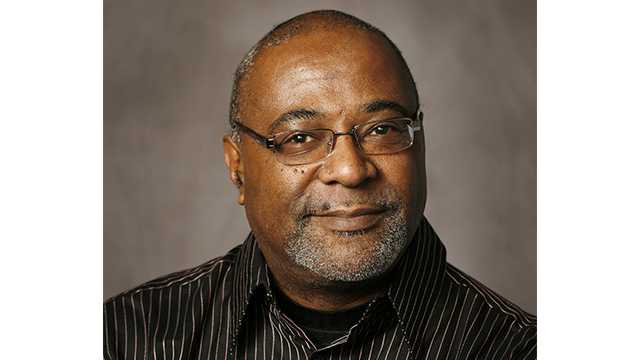 Edna Kane Williams, sister of the late Milwaukee Journal Sentinel columnist Eugene Kane (pictured), has established a scholarship fund at Temple University to honor his memory. Checks should be made out to “Temple University.” The memo line should include “Eugene Kane Scholarship Fund.” Contributions may be mailed to Temple University, Institutional Advancement, P.O. Box 827651, Philadelphia, PA 19182-7651.
Edna Kane Williams, sister of the late Milwaukee Journal Sentinel columnist Eugene Kane (pictured), has established a scholarship fund at Temple University to honor his memory. Checks should be made out to “Temple University.” The memo line should include “Eugene Kane Scholarship Fund.” Contributions may be mailed to Temple University, Institutional Advancement, P.O. Box 827651, Philadelphia, PA 19182-7651.
- Less than a month after Morgan Givens, an African American producer for WAMU-FM’s nationally syndicated talk show “1A,” tweeted that the Washington NPR station was “actively seeking a way to fire me” — denied by General Manager J.J. Yore — the station has demoted its news director, Jeffrey Katz. “In recent weeks, our organization has grappled with structural challenges and tensions in the newsroom that have undermined morale and led to employee turnover,” Yore said in a statement Thursday. “This is not representative of WAMU’s values and what we strive to be as a top-rated public media institution.”
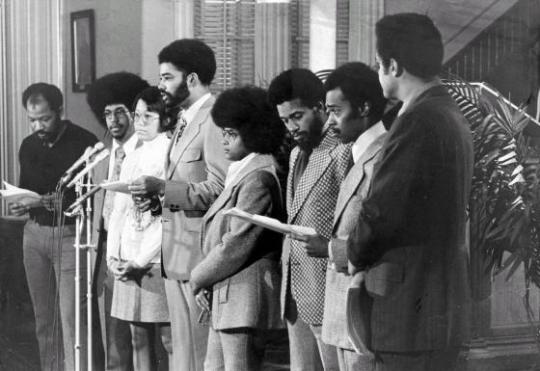 Leon Dash, Richard Prince and Ronald A. Taylor, members of the Washington Post Metro Seven (pictured), who filed a racial complaint against The Washington Post in 1972, are to discuss how the case affected the Post and journalism overall, how much has changed and what can be done in meeting its goals in newsrooms today. The conversation takes place before the New England chapter of the Society of Professional Journalists Wednesday at 7 p.m. Eastern and can be viewed here: https://www.facebook.com/events/295834321650792/
Leon Dash, Richard Prince and Ronald A. Taylor, members of the Washington Post Metro Seven (pictured), who filed a racial complaint against The Washington Post in 1972, are to discuss how the case affected the Post and journalism overall, how much has changed and what can be done in meeting its goals in newsrooms today. The conversation takes place before the New England chapter of the Society of Professional Journalists Wednesday at 7 p.m. Eastern and can be viewed here: https://www.facebook.com/events/295834321650792/
 “The New Yorker Radio Hour,” which airs on public radio and as a podcast and is hosted by Editor David Remnick, produced “Who Gets to Be Italian?” on Thursday. “Children of African immigrants born in Italy may spend their whole lives there considered foreigners by the law. Some are fighting to change that,” reads the summary. (Pictured: Italian soccer player Mario Balotelli Barwuah)
“The New Yorker Radio Hour,” which airs on public radio and as a podcast and is hosted by Editor David Remnick, produced “Who Gets to Be Italian?” on Thursday. “Children of African immigrants born in Italy may spend their whole lives there considered foreigners by the law. Some are fighting to change that,” reads the summary. (Pictured: Italian soccer player Mario Balotelli Barwuah)
- “Today, nearly every African country holds multiparty elections of some kind, but – as in the case worldwide – relatively few fully respect political rights and civil liberties,” a group called the Resistance Bureau wrote Monday for African Arguments. “This situation was already worrying before the pandemic. In 2019, advocacy group Freedom House touted the headline ‘Global Press Freedom in Peril’ and gave most African countries a 0 or 1 (of a maximum 4) for media freedoms. . . . However, since COVID-19 hit, matters have got worse as ruling parties attempt to avoid criticism and maintain control over how the pandemic is viewed. . . .”
- “Paraguayan authorities must thoroughly investigate the detention and assault of journalist Roberto Esquivel and ensure those responsible are held to account,” the Committee to Protect Journalists said Thursday. “On July 18, Paraguayan soldiers detained Esquivel, a local freelance journalist . . . while he was reporting on the country’s shutdown amid the COVID-19 pandemic. . . . In a video of the detention shared on social media, about five soldiers are seen grabbing Esquivel on the street and placing him in the back of a truck. Esquivel later told local media that the soldiers handcuffed him, covered his head with a balaclava, and hit him without any explanation. He received bruises on his face, torso, and arm, according to reports. . . .”
- Reporters Without Borders said July 16 it “condemns the arbitrary arrests of two journalists in the past two months in Niger. They constitute a disturbing reversal for press freedom in a country that had seen significant progress in recent years. One of the journalists is still being held. The latest victim is Ali Soumana, the founder and editor of the newspaper Le Courrier and a member of the Norbert Zongo Cell for Investigative Journalism in West Africa (CENOZO), who spent two days in police custody after being summoned for questioning by the judicial police in the capital. . . . Samira Sabou, a freelance journalist and blogger who runs the Mides-Niger website, has meanwhile been held since 10 June. . . .”
- “Cameroonian rights and press groups are alleging a military cover-up in the death of journalist Samuel Wazizi, after the military on Monday refused to hand over his body to the family,” Moki Edwin Kindzeka reported July 8 for the Voice of America. “Cameroon’s military in June admitted Wazizi had died at a military hospital in August last year after months of silence on his whereabouts or condition. Supporters of Wazizi, who was arrested for allegedly collaborating with anglophone rebels, have accused the military of torturing him to death — a charge they deny. . . .”
Journal-isms Fund Drive Continues

“As a veteran reporter, I turn to Richard Prince’s Journal-isms all the time for the latest information on people of color in our business. There is no spin, no slant, just the facts to keep us informed. I also appreciate that he holds journalists and media companies accountable . . . . Keep up the good work. #NoSpinAllowed” (Courtesy Rebecca Aguilar)
— Rebecca Aguilar, freelance reporter; diversity committee chair, Society of Professional Journalists; former vice president, National Association of Hispanic Journalists.Support Journal-isms
[btnsx id=”5768″]
Facebook users: “Like” “Richard Prince’s Journal-isms” on Facebook.
Follow Richard Prince on Twitter @princeeditor
Richard Prince’s Journal-isms originates from Washington. It began in print before most of us knew what the internet was, and it would like to be referred to as a “column.” Any views expressed in the column are those of the person or organization quoted and not those of any other entity. Send tips, comments and concerns to Richard Prince at journal-isms-owner@yahoogroups.com
View previous columns (after Feb. 13, 2016).
- Diversity’s Greatest Hits, 2018 (Jan. 4, 2019)
- Book Notes: Is Taking a Knee Really All That? (Dec. 20, 2018)
- Book Notes: Challenging ’45’ and Proudly Telling the Story (Dec. 18, 2018)
- Book Notes: Get Down With the Legends! (Dec. 11, 2018)
- Journalist Richard Prince w/Joe Madison (Sirius XM, April 18, 2018) (podcast)
- Richard Prince (journalist) (Wikipedia entry)
- February 2018 Podcast: Richard “Dick” Prince on the need for newsroom diversity (Gabriel Greschler, Student Press Law Center, Feb. 26, 2018)
- Diversity’s Greatest Hits, 2017 — Where Will They Take Us in the Year Ahead?
- Book Notes: Best Sellers, Uncovered Treasures, Overlooked History (Dec. 19, 2017)
- An advocate for diversity in the media is still pressing for representation, (Courtland Milloy, Washington Post, Nov. 28, 2017)
- Morgan Global Journalism Review: Journal-isms Journeys On (Aug. 31, 2017)
- Diversity’s Greatest Hits, 2016
- Book Notes: 16 Writers Dish About ‘Chelle,’ the First Lady
- Book Notes: From Coretta to Barack, and in Search of the Godfather
- Journal-isms’ Richard Prince Wants Your Ideas (FishbowlDC, Feb. 26, 2016)
- “JOURNAL-ISMS” IS LATEST TO BEAR BRUNT OF INDUSTRY’S ECONOMIC WOES (Feb. 19, 2016)
- Richard Prince with Charlayne Hunter-Gault,“PBS NewsHour,” “What stagnant diversity means for America’s newsrooms” (Dec. 15, 2015)
- Book Notes: Journalists Follow Their Passions
- Book Notes: Journalists Who Rocked Their World
- Book Notes: Hands Up! Read This!
- Book Notes: New Cosby Bio Looks Like a Best-Seller
- Journo-diversity advocate turns attention to Ezra Klein project (Erik Wemple, Washington Post, March 5, 2014)
![]()

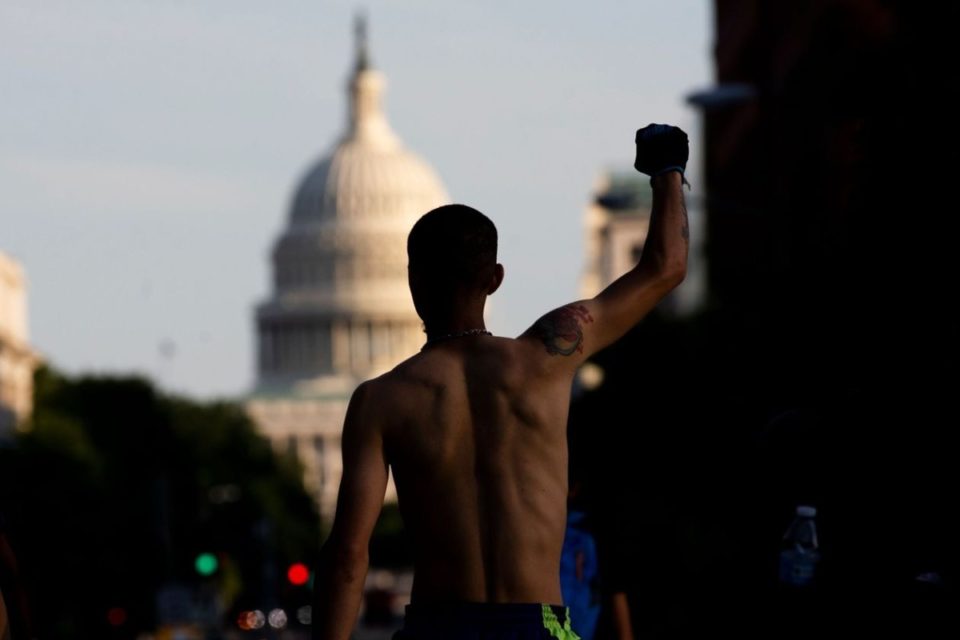
31 comments